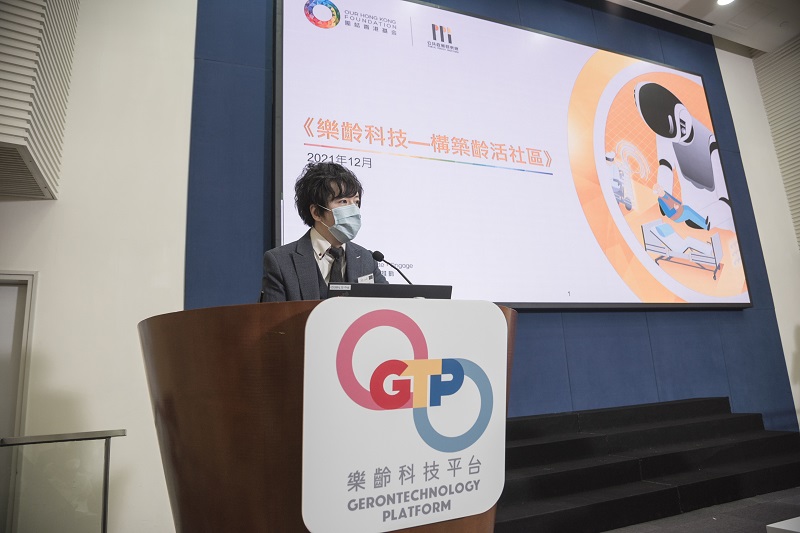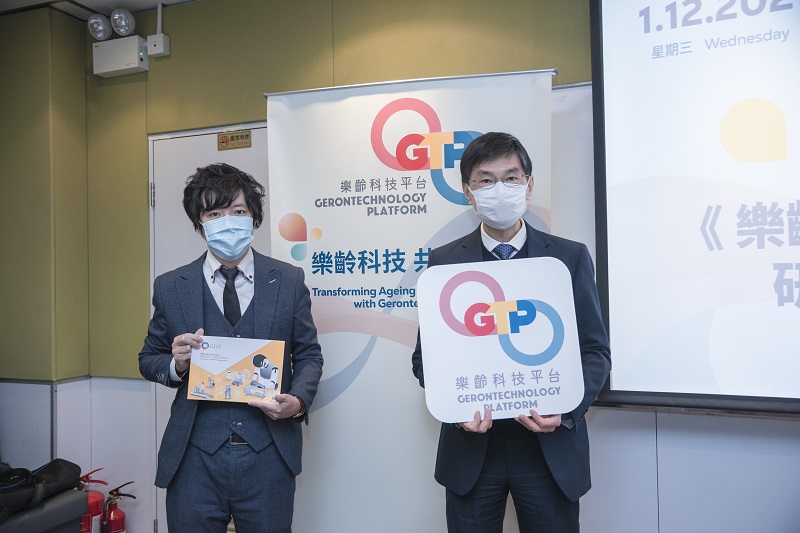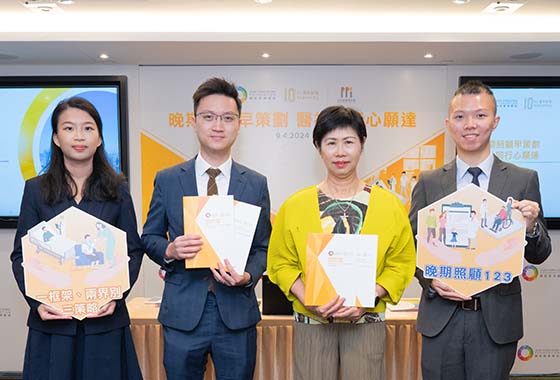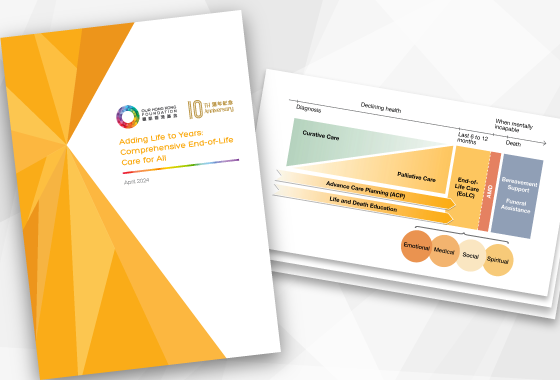Building an Age-Friendly City
OHKF Releases Gerontechnology Report to Promote Building an Age-Friendly City
(1 December 2021, Hong Kong) To ensure that gerontechnology development in Hong Kong remains relevant to social trends and market needs, the Gerontechnology (GT) Platform regularly reviews the effectiveness of various gerontech projects. As a collaborative partner of the Platform, Our Hong Kong Foundation (OHKF) publishes its latest research report entitled Building an Age-Friendly City—Embedding Gerontechnology into Everyday Life (the Report), putting forward policy recommendations in five key areas, to further develop Hong Kong’s gerontech ecosystem to help overcome the various challenges associated with population ageing.
Setting out New Policy Direction for Industry Development
In 2017, the OHKF and HKCSS published the city’s first gerontechnology report, which identified 24 gaps that represented the key opportunities and challenges facing Hong Kong’s gerontech ecosystem at the time. Over the past few years, both the HKSAR Government and industry partners have launched numerous initiatives to help promote gerontech. As such, our latest Report noted improvement in several areas, particularly gerontech awareness, government risk aversion, and applied research funding. However, the Report also indicated that most of the gaps only saw slight improvement since 2017, with three gaps worsened, including insufficient retirement protection, academics’ lack of incentives to pursue gerontech research, and complicated medical device registration processes.
In order to further develop Hong Kong's gerontech ecosystem, the Report proposes a series of policy recommendations in five key areas, namely related to supply-side, demand-side, infrastructure, investment, and talent development.
Fostering Gerontech Ecosystem through the Platform’s Capacity-Building and Stakeholder Collaboration Initiatives
While the number of gerontech suppliers has grown in the past few years, there remains a few gaps in actually bringing these products and services into the hands of end-users. As one of the main goals of the GT Platform is to connect supply- and demand-side stakeholders, we recommend the GT Platform’s future testing grounds allow suppliers to conduct both gerontech product evaluation and enhancement. We also suggest the GT Platform to add a comment function to the existing Product List to enable suppliers to collect user feedback.
Another mandate of the GT Platform is capacity building for the gerontech industry, which is particularly important for start-ups, as their limited resources make it difficult to connect with end-users, understand their needs and the regulatory requirements of the elderly and rehabilitation services industry. Therefore, the OHKF proposes the GT Platform set up an advisory group composed of end-users such as the elderly, persons with disabilities, and carers, and provide specialised training courses for start-ups.
In addition, given the small scale of Hong Kong’s gerontech market, many local businesses would like to tap into other regions such as the GBA, while many foreign companies are reluctant to export their products to Hong Kong and pay extra costs for product localisation. Therefore, we advocate the GT Platform helping local start-ups to conduct site visits and product trials in GBA service units.
Furthermore, the Platform should collaborate with InvestHK to establish strategic partnerships with international gerontech organisations, in order to assist companies to understand gerontech-related standards and cultural practices in Hong Kong and other regions. Consultancy services should be provided to facilitate the import and export of gerontech products and services in Hong Kong.
Leveraging a Multidimensional Approach to Boost Gerontech Usage in the Community
At present, with an increase in gerontech awareness and the number of suppliers, more end-users have gained access to various gerontech products and services. However, many of them do not have the purchasing power to acquire gerontech products on their own. The Government must therefore play a key role in generating momentum to sustain the gerontech market’s growth in the coming years.
One of the largest challenges currently facing Hong Kong’s gerontech ecosystem is helping end-users in the community to access and utilise gerontech. Currently, the Innovation and Technology Fund for Application in Elderly and Rehabilitation Care (HK$1 billion I&T Fund) is the most important gerontech-related Government funding. However, as more than half of Hong Kong’s elderly homes are 100% privately funded, elderly living in these facilities cannot benefit from the Fund. Therefore, we recommend that the Social Welfare Department renew and extend the Fund to cover all 100% privately funded care service providers.
Moreover, only less than 8.1% of the elderly in Hong Kong live in residential care homes, whereas the vast majority (91.9%) live in domestic households, meaning that most end-users do not receive any direct gerontech-related government subsidies. The OHKF suggests the Government expand the scope and amount of the Elderly Health Care Voucher Scheme and the Community Care Service Voucher to help the elderly procure gerontech products and services.
In addition, as there are no public facilities where end-users can easily access products in all 18 districts in Hong Kong, the Foundation proposes the Government set up a "Gerontech Corner" in District Health Centres. The purpose of this “corner” is to allow users to use the extended voucher schemes to directly purchase or rent gerontech products, promote public education and awareness, and serve as a "product testing hub" to collect users’ feedback.
Currently, although there are initiatives that help elderly and persons with disabilities living in public housing to receive basic home modification, unfortunately similar schemes do not exist for end-users living in private housing. Therefore, the Government should set up a similar home modification scheme for those who in private housing, under which eligible households would receive a one-off subsidy of up to HK$10,000.
Last but not least, we hope that the Government will adopt measures to attract more parties to foster the development of the gerontech ecosystem. For instance, the Government should seek more gerontech public-private partnership opportunities, particularly through the innovative “Pay-for-Success” financing model. We also recommend the Government cultivate more gerontech talent through organising Qualifications Framework-recognised gerontech skill training courses and optimising university policies related to knowledge transfer.
OHKF Assistant Research Director and Head of Economic Development Research of Public Policy Institute Kenny Shui pointed out: “Gerontechnology is widely adopted in advanced economies as a key to address the challenges associated with population ageing, with the pandemic further accelerating its development. In anticipation of the growth in demand for gerontech products, we must ensure that the relevant suppliers, infrastructure, investment, and talents grow and develop in the meantime. Indeed, the GT Platform is ideally positioned to connect different stakeholders for collaboration that can help further develop the city’s gerontech ecosystem.”
Building an Age-Friendly City—Embedding Gerontechnology into Everyday Life
Chinese Version: https://bit.ly/3rb64Kd
English Version: https://bit.ly/3HWKXS0





